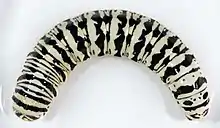Cucullia speyeri
Cucullia speyeri, common names Speyer's paint, Speyer's cucullia or Speyer's hooded owlet moth, is a moth found in North America. It is found from Alberta and Montana to the Atlantic coast from New Hampshire to Virginia. It was described by Joseph Albert Lintner in 1874. In the US state of Connecticut, it is listed as a species of special concern and is believed to be extirpated.[2] The habitat consists of open meadows, dry grasslands and native prairies.
| Cucullia speyeri | |
|---|---|
 | |
| Larva | |
| Scientific classification | |
| Kingdom: | Animalia |
| Phylum: | Arthropoda |
| Class: | Insecta |
| Order: | Lepidoptera |
| Superfamily: | Noctuoidea |
| Family: | Noctuidae |
| Genus: | Cucullia |
| Species: | C. speyeri |
| Binomial name | |
| Cucullia speyeri | |
The wingspan is about 48 mm (1.9 in).[3] The forewings are pale grey and finely streaked. The hindwings are white with a dark margin. Adults are on wing in late spring and summer.
The larvae feed on herbaceous Asteraceae and Conyza species.[4]
References
- Savela, Markku. "Cucullia speyeri Lintner, 1874". Lepidoptera and Some Other Life Forms. Retrieved January 2, 2018.
- "Connecticut's Endangered, Threatened and Special Concern Species 2015". State of Connecticut Department of Energy and Environmental Protection Bureau of Natural Resources. Retrieved January 1, 2018.
- mothphotographersgroup
- "Cucullia speyeri Lintner, 1874". Pacific Northwest Moths. Retrieved January 2, 2018.
This article is issued from Wikipedia. The text is licensed under Creative Commons - Attribution - Sharealike. Additional terms may apply for the media files.